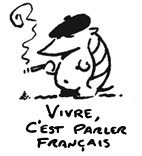|
|


To describe and introduce things or people in French, two common phrases are used:
c'est and il/elle est.
The plural forms are ce sont and ils/elles sont.

The choice between c'est and il / elle est
is not always easy, but there are basic principles which can guide you in the choice.
A rule of thumb is that c'est or ce sont are followed by a determined noun
('le tatou', 'une Américaine', 'mes livres'). Remember that nouns in French are preceded by a determiner.
Il/elle est and ils/elles sont are followed by an adjective ('content', 'sympathique').

c'est/ce sont
C'est and ce sont are followed by the following:

 |
| + noun, including modified nouns |
|
| Tex? C'est un tatou. C'est un Américain. C'est un petit tatou bilingue. |
|
Tex? He's an armadillo. He is an American. He is a small bilingual armadillo. |
| |
|
|
| Tammy et Tex? Non, ce ne sont pas des chats! Ce sont des tatous. |
|
Tammy and Tex? No they are not cats! They are armadillos. |
|
| + proper noun |
|
C'est Tex. |
|
It's Tex. |
| + disjunctive pronoun |
|
| Tammy: Allô Tex? C'est moi. |
|
Tammy: Hello Tex? It's me. |
| |
|
|
| Tex: Qui est-ce? Ah, c'est toi Tammy! |
|
Tex: Who is this? Oh, it's you Tammy! |
|
| + dates |
|
Tex: Mon anniversaire? C'est le quatorze juillet. C'est jeudi prochain! |
|
Tex: My birthday? It's July 14th. It's next Thursday! |
| + an infinitive as subject |
|
Tex: Vivre, c'est parler français. |
|
Tex: To live is to speak French! |
| + adjective for non-specific referents |
|
Tex: Ah c'est chouette! C'est incroyable! |
|
Tex: Oh, that's neat! That's unbelievable. |
|

il/elle est/ils/elles sont
Use il/elle est or ils/elles sont to introduce the following:

 |
| + adjective alone |
|
Tex? Il est arrogant! Il n'est pas français. Il est américain.

Tammy? Elle est gentille. |
|
Tex? He is arrogant! He isn't French. He is American.

Tammy? She is nice. |
| + nationality, occupation, religion (used as adjectives in French) |
|
Tex? Il est poète.

Trey? Il est musicien.

Tammy? Elle est étudiante. |
|
Tex? He is a poet.

Trey? He is a musician.

Tammy? She is a student. |
|

Remember that il(s) and elle(s) refer to a specific person or thing.
Ce does not refer to a specific person or thing; it is usually translated as that.

 |
| Il est stupide. (He's stupid.) |
|
C'est stupide. (That's stupid.) |
|


|
|
|
|